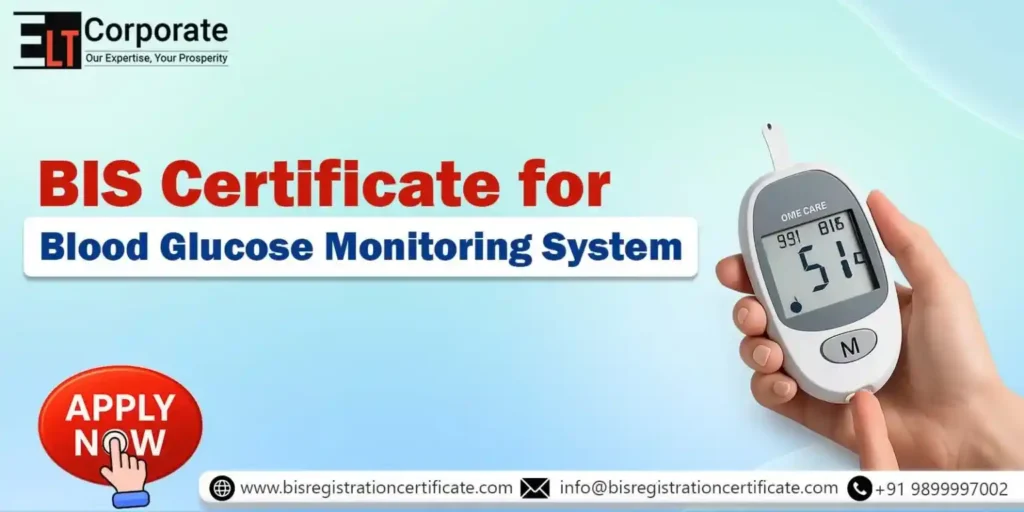People with diabetes use Blood Glucose Monitoring Systems to perform regular checks on their blood sugar levels. These devices perform essential functions for patient safety together with healthcare management. The Government of India mandates BIS certification for these entities because of this requirement. The certification process guarantees that devices follow to defined quality benchmarks and performance criteria. The Bureau of Indian Standards manages the operations of the Compulsory Registration Scheme. Before selling Blood Glucose Monitoring Systems in India, manufacturers and importers must obtain a BIS certificate under this scheme. This article explains the proces,requirments, and benefits of securing a BIS certificate for blood glucose monitoring system.
What is BIS Certification?
Bureau of Indian Standards operates as the national body responsible for establishing quality benchmarks while verifying that products adhere to safety, reliability, and performance criteria.
The BIS certification process guarantees that products meet the established Indian standards. The sale of specific electronic and medical devices like blood glucose monitors in the Indian market requires mandatory BIS certification under the Compulsory Registration.
Why is BIS Certificate for Blood Glucose Monitoring System required?
Blood glucose monitors are critical medical devices that must deliver accurate and dependable readings. Inaccurate readings can lead to incorrect treatment, posing a serious threat to the user’s health. Thus, the Government of India, via BIS, mandates that these devices conform to Indian Standards for:
- Patient safety
- Product accuracy
- Electromagnetic compatibility
- User interface design
- Sterility (for disposable parts)
This is done under the Compulsory Certification Scheme implemented through Quality Control Orders (QCOs) issued by the Ministry of Health and Family Welfare or Ministry of Consumer Affairs.
Applicable Indian Standard for BGMS
The Indian Standard governs the BIS certification for blood glucose monitoring systems:
- IS/ISO 15197:2013
In vitro diagnostic test systems – Requirements for blood-glucose monitoring systems for self-testing in managing diabetes mellitus.
This standard ensures:
- System accuracy (including strip calibration)
- Repeatability and reproducibility
- Interference resistance
- Stability in real-world conditions
- User instructions and usability testing
This standard is aligned with international norms adopted by ISO and IEC.
Who Must Obtain BIS Certification for Blood Glucose Monitoring System?
The following entities are required to obtain BIS Certificate for Blood Glucose Monitoring System before selling or distributing BGMS in India:
| Stakeholder | Certification Requirement |
| Domestic Manufacturers | Must obtain a BIS license for manufacturing |
| Foreign Manufacturers | Must obtain BIS registration via an Authorised Indian Representative (AIR) |
| Importers/Distributors | Must only source BIS-certified BGMS products |
Failure to comply with BIS regulations is punishable under the BIS Act, 2016, and may result in:
- Seizure of products
- Fines up to ₹5 lakhs
- Ban on sale/import
BIS Certification Schemes Applicable for BGMS
1. ISI Mark Certification Scheme (Scheme-I)
Applicable to domestic manufacturers producing blood glucose monitors in India.
2. Compulsory Registration Scheme (CRS)
Applied to electronic items, including imported BGMS devices, especially those incorporating:
- Microprocessors
- Battery-powered operation
- Display screens
BIS may prescribe either scheme depending on how the device is categorised in the notification
Documents Required for BIS Certification for Blood Glucose Monitoring
To successfully obtain a BIS certificate for Blood Glucose Monitoring System, manufacturers must prepare the following key documents:
| Document | Description |
|---|
| Business License | Certificate of Incorporation or GST |
| Product Details | Technical datasheet, model numbers |
| Test Reports | From BIS-recognized labs only |
| AIR Authorization | For foreign manufacturers |
| Undertaking & Affidavit | As per BIS guidelines |
| Factory Details | Layout, manufacturing process flow |
Read More: Documents Required For BIS Registration
Step-by-Step Process to Obtain BIS Certification for Blood Glucose Monitoring System
Here’s a step-by-step breakdown of how to obtain BIS Certificate for Blood Glucose Monitoring System:
- Determine Applicability: Confirms whether you under the notified list of electronic goods under CRS. Blood Glucose Monitoring Systems are listed items.
- Choose an Authorized Indian Representative: If you’re a foreign manufacturer, appoint an Indian representative to act on your behalf.
- Testing from BIS-Recognized Lab: Send product samples to a BIS-recognized laboratory for testing. The lab will check:
- Electrical safety
- EMC/EMI compliance
- Functional accuracy
- Online Application via BIS Portal: Apply online on www.manakonkine.in under the CRS scheme.
- Review and Grant of Registration: BIS reviews the application, verifies the documents and if everything is in order, issues the registration certificate.
Read More: Process for getting BIS for Certification
Cost of BIS Certification for BGMS
| Component | Estimated Cost (INR) |
|---|---|
| Application Fee | ₹1,000 – ₹5,000 |
| Product Testing | ₹40,000 – ₹70,000 |
| Inspection Fee | ₹10,000 – ₹25,000 |
| BIS License Fee | ₹5,000 – ₹10,000 |
| Consultant Fee (Optional) | ₹25,000 – ₹50,000 |
| Total Cost Estimate | ₹80,000 – ₹1.5 lakhs |
Validity and Renewal of BIS Certification
Below, we mentioned validity and renewal of BIS certificate
- Valid for two years
- Renewed upon:
- Fresh test report submission
- Payment of renewal fee
- Continued production facility compliance
Penalties for Non-Compliance
Under the BIS Act, 2016, non-compliance attracts:
| Violation | Penalty |
|---|---|
| Manufacturing without BIS License | Fine up to ₹2 lakhs or imprisonment up to 2 years |
| Sale/Import of unregistered devices | Confiscation + Fine |
| Misuse of ISI mark | Legal prosecution + cancellation of license |
Benefits of BIS Certification for Blood Glucose Monitoring Systems
Below we matiioned some Benefits of BIS Certificate for blood glucose Monitoring system:
For Manufacturers
- Enhances product credibility and brand recognition
- Enables entry into government tenders and institutional sales
- Legal compliance with Indian regulatory requirements
For Importers
- Smooth customs clearance
- Distribution and sales in retail and hospitals
- Fulfils regulatory due diligence for e-commerce platforms
For Consumers
- Assurance of safety and accuracy
- Better decision-making in diabetes management
- Protection from substandard or counterfeit devices
Role of BIS CARE Mobile App
Consumers can verify the authenticity of certified glucometers by scanning the BIS registration number or entering the ISI mark license number in the BIS CARE app.
Features of the BIS CARE app:
- Verify product registration
- View manufacturer details
- Report fake products
- Consumer awareness features
Challenges Faced During BIS Compliance
Manufacturers, especially startups and MSMEs, often face:
- High product testing costs
- Delay in test lab availability
- Language barriers in documentation (especially for foreign brands)
- Complexity in identifying correct Indian standards
Solution: BIS has introduced online portals, increased recognized labs, and encourages training via webinars and technical manuals.
Recent Updates on Glucometer Certification
- In 2022, BIS and CDSCO issued notifications increasing surveillance on imported BGMS devices.
- As of April 2023, ecommerce platforms like Amazon and Flipkart are required to list only BIS-certified glucometers.
- BIS has also proposed integration with UDI (Unique Device Identification) systems for traceability.
Conclusion
Blood Glucose Monitoring Systems achieve critical safety benchmarks through BIS certification which ensures these essential medical tools deliver top-tier precision and reliability. India experiences a diabetes epidemic causing glucometer demand to reach unprecedented levels.
Manufacturers and importers find BIS certification to be more than a mandatory regulation since it represents a chance to build consumer confidence while supporting public health initiatives. Consumers receive assurance that their everyday devices meet top quality standards through construction excellence.
Is BIS certification mandatory for Blood Glucose Monitoring Systems in India?
Yes, BIS certification is mandatory under the Compulsory Registration Scheme (CRS) for BGMS as per Indian standards.
Which Indian Standard applies to Blood Glucose Monitors?
IS 13450:2022 applies to blood glucose monitoring systems, aligning with IEC 60601-1 for electrical medical equipment safety.
Who needs to obtain BIS certification for BGMS?
Manufacturers—both Indian and foreign—must obtain BIS registration before selling BGMS in the Indian market.









